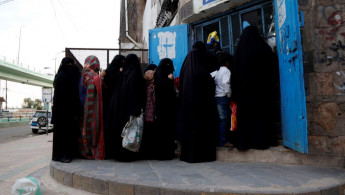Surging food, fuel prices pushing Yemenis into 'extreme poverty', warns UN WFP
The UN World Food Programme (WFP) offered a stark warning on Sunday about the rise of “extreme poverty” in Yemen.
The humanitarian organisation said “currency depreciation and rising food prices have pushed many” to the brink in the war-torn country.
Yemen’s civil war, which began in 2014, has spawned one of the world’s largest humanitarian crises, with the Yemeni riyal plummeting in value and fuel prices rocketing leaving local communities destitute.
“Hunger is rising, leaving many dependent on food assistance,” said the UN WFP in a statement.
The value of Yemen’s currency has dwindled to more than 1,200 riyals against the US dollar in 2022. When the conflict first started, the dollar price was 215 Yemeni riyals in the local market.
Fuel prices have also recently surged to their highest levels since 2014, reaching more than $88 a barrel after Saudi Arabia launched a series of airstrikes on Sanaa after a Houthi attack on UAE targets.
The rise in basic goods has pushed many families to resort “to harmful coping mechanisms to make ends meet”, said the UN Refugee Agency last week.
The UNHCR said ten children were found to be either begging or be engaged in child labour in just one week in the capital Sanaa this month.
It also cautioned that the rise in fuel prices was impacting the ability of humanitarian organisations to conduct their daily activists, particularly in remote areas.
The seven-year conflict in Yemen, between the internationally recognised government backed by a Saudi-led coalition and the Iran-aligned Houthis, has displaced millions of people and led to hundreds of thousands of deaths.
Over 20 million people are currently in need of humanitarian assistance and protection, according to the UN.





 Follow the Middle East's top stories in English at The New Arab on Google News
Follow the Middle East's top stories in English at The New Arab on Google News
![The UAE is widely suspected of arming the RSF militia [Getty]](/sites/default/files/styles/image_330x185/public/2024-11/GettyImages-472529908.jpg?h=69f2b9d0&itok=Yauw3YTG)
![Netanyahu furiously denounced the ICC [Getty]](/sites/default/files/styles/image_330x185/public/2024-11/GettyImages-2169352575.jpg?h=199d8c1f&itok=-vRiruf5)
![Both Hamas and the Palestinian Authority welcomed the ICC arrest warrants [Getty]](/sites/default/files/styles/image_330x185/public/2024-11/GettyImages-2178351173.jpg?h=199d8c1f&itok=TV858iVg)